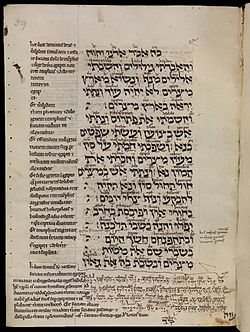| Ezekiel 37 | |
|---|---|
 Book of Ezekiel 30:13–18 in an English manuscript from early 13th century, MS. Bodl. Or. 62, fol. 59a. A Latin translation appears in the margins with further interlineations above the Hebrew. | |
| Book | Book of Ezekiel |
| Hebrew Bible part | Nevi'im |
| Order in the Hebrew part | 7 |
| Category | Latter Prophets |
| Christian Bible part | Old Testament |
| Order in the Christian part | 26 |
Ezekiel 37 is the thirty-seventh chapter of the Book of Ezekiel in the Hebrew Bible or the Old Testament of the Christian Bible. This book contains the prophecies attributed to the prophet/priest Ezekiel, and is one of the Nevi'im (Prophets). [1] This chapter contains a vision of the resurrection of dry bones, widely known as the Vision of the Valley of Dry Bones, in which Ezekiel at last assures the captives in Babylon that they will return from exile. [2]
